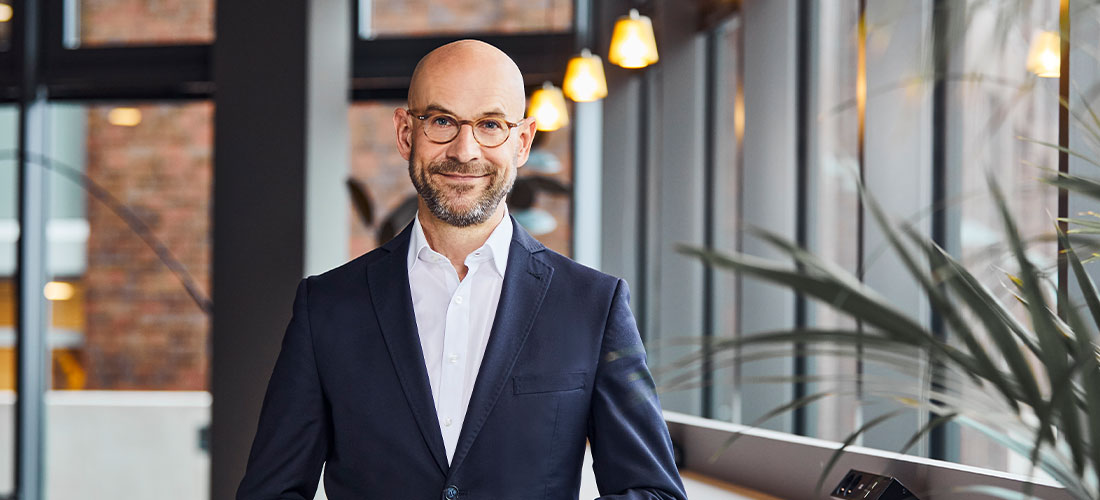ACROSS: This year, you will be a member of the prestigious MAPIC Awards jury once again. The MAPIC Awards traditionally recognize outstanding achievements within the retail real estate industry. Why is emphasizing and highlighting positive examples more important than ever these days?
STEFFEN ERIC FRIEDLEIN: When we read the daily newspapers, watch the news, or visit social media channels, we are bombarded by negative information about the industry. Yes, there are a number of major challenges that need to be addressed, but this strong emphasis on the negative completely overshadows the many areas in which things are going well. There are numerous examples, projects, and concepts that are not only very innovative, but, more importantly, very successful. In some cases, they are even more successful than they were before the coronavirus pandemic. It is, therefore, all the more important to showcase them – as sources of encouragement and inspiration, especially in difficult times. The MAPIC Awards provide an excellent way in which to do that, as their appeal throughout the industry is enormous.
ACROSS: Which contributions from which categories are you personally looking forward to the most? Where do your greatest expectations lie?
FRIEDLEIN: Personally speaking, I find the categories that focus on improving the customer journey at existing properties particularly exciting, such as the best in-store experience or refurbishment projects in general, as the era of major new project developments is more or less over in many countries. That’s why developing existing concepts and ensuring that they remain relevant to customers is so important. I’m also particularly interested in learning about any new brand in any sector, whether retail or gastronomy, that enriches our industry with great ideas.
ACROSS: What constitutes excellence in 2024?
FRIEDLEIN: There’s a fundamental condition for success in retail: no standstill. Concepts have to evolve in line with changing customer needs. In terms of the current developments in retail, excellence means: Retailers must, for example, implement a consistent omnichannel approach, in other words, the seamless and successful integration of online and offline channels in order to offer customers the best shopping experience both in-store and online.
ACROSS: What are some of the other key trends that play significant roles in the success of a location or a property, as evidenced by the MAPIC Awards submissions?
FRIEDLEIN: For shopping centers, the continuous development of the tenant mix is crucial. New brands have gained a foothold in the market. Completely new sectors have emerged, particularly in the gastronomy and leisure sectors, which, of course, have to be reflected in the tenant mix. However, the properties themselves also need to be constantly adapted to changing customer and tenant needs as well as new spatial requirements. For example, larger areas may need to be divided up or rearranged, or several smaller areas may need to be combined. Department stores are prime examples. For decades, that was a common format used for up to 15,000 square meters of space. There is virtually no demand for that format at any center today.
ACROSS: So, flexibility is the most important characteristic.
FRIEDLEIN: Yes, flexibility as well as the will and courage to undergo genuine transformation. Changes need to be made and, in some cases, locations need to be fundamentally realigned in order for them to remain relevant. Being curious about and open to new sectors and tenants that weren’t previously on the shopping center world’s radar is essential.
ACROSS: Can you give us an example?
FRIEDLEIN: The wellness sector, which has become an important element of some centers, comes to mind. The range on offer in that area has diversified considerably. That industry also has extensive interfaces with the medical sector and is in great demand. Gastronomy is another example. Just a few years ago, that sector had a much simpler structure and there was hardly any variation between centers. Today, the environment of each center determines the F&B offer, and the offers have become more distinct in both the fast food and casual dining segments.
ACROSS: What impact does this constant state of change have on leasing?
FRIEDLEIN: We have to anticipate future trends. However, not every trend will prevail in the long term; therefore, not every concept will become a long-term rental partner. That’s why creating test opportunities is so important. At ECE Marketplaces, our experience with pop-up spaces that can be rented out for short periods of time has been very good. That way, everyone wins: Customers always have the chance to experience new things, potential tenants can try things out, and landlords can minimize their risks. Ideally, a pop-up store winds up being successful, and we can enter into a long-term rental agreement.
ACROSS: To be clear: Not only do you need to have the courage to innovate, but you also have to be willing to let certain innovations go.
FRIEDLEIN: The ever-increasing pace of change in society and retail presents a challenge to everyone involved. There are numerous innovative concepts and operators, which is great to see. That said, it is all the more important to be able to try out new things without taking big risks. Both tenants and landlords make investments when launching a new concept. However, there’s no shame in realizing that something isn’t working and that, at a certain point, a concept no longer appeals to customers. The industry has learned a lot in terms of error culture.
ACROSS: What developments have surprised you over the past few years?
FRIEDLEIN: I’ve been somewhat surprised by how well and how quickly entertainment concepts have developed, especially in Germany. Ten years ago, it was nearly impossible to find German customers who combined shopping and leisure activities. There has been a major shift in that regard. We have implemented a wide variety of concepts at several ECE locations and have seen excellent development and seamless integration into each respective tenant mix. I also find the development of gastronomy remarkable, specifically in the slightly upmarket segment. There is a clear trend towards high quality in that area, which is in strong contrast to the former supply-oriented character of F&B at shopping centers. All of those things have contributed to the general trend towards cozier atmospheres, greater social interaction, and the discovery of shopping centers as community hubs.
ACROSS: ECE’s Berlin-based The Playce is a center that is specifically geared toward entertainment and gastronomy.
FRIEDLEIN: Analysis of the location revealed that a focus on gastronomy and entertainment, as well as experimental and experiential retail concepts would lead to success. The center is proof that taking a customized approach to the conversion of a center and its tenant mix, in general, is essential. Simply put: Gastronomy plays a greater role at some locations, as does entertainment, which is the case at Potsdamer Platz. Such an approach would be completely inappropriate at other locations.
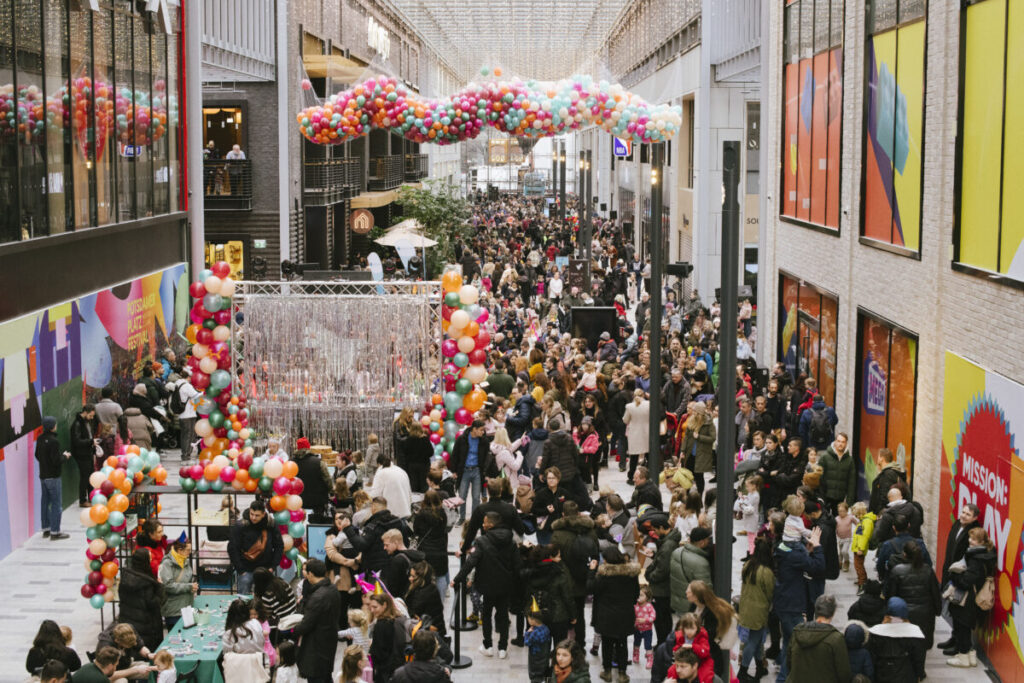
ACROSS: The Playce is also proof that fundamental change can only be achieved with strong partners.
FRIEDLEIN: Yes, the property had become outdated as Potsdamer Platz Arkaden, also because the previous owner was rather exitoriented. The current owner, Brookfield, has pursued a completely different strategy and has had a clear vision right from the start: A traditional shopping center is rather hard to justify at this location; instead, the property aims to stimulate the entire surrounding area by offering a multi-layered range of leisure activities, gastronomy, and retail of a special nature. Each category contributes its own USP to the location. The mix has turned out to be quite successful. Nevertheless, it was extremely courageous of the owner to approve our ideas – with complete conviction. The conversion was substantial and required a certain degree of decisiveness. The end result proves that everything is right on track. The last remaining concepts are due to go online within the next few months.
ACROSS: The 2024 MAPIC Awards are also centered around the issue of refurbishment. This marks the second time that the awards recognize and honor the most successful refurbishment of a retail location. In your opinion, what makes a refurbishment successful?
FRIEDLEIN: The most important thing is that a customized, location-specific approach must be taken. A one-size-fits-all concept that is rolled out across the entire portfolio in the hope of generating synergy effects is destined to fail. A successful refurbishment is always tailored to the customers, the catchment area, and the needs of the retailers. If, for example, a department store space is vacated, it should not be converted into any old space that is then rented out; space that is optimally tailored to the new tenants and their concepts must be created. ESG and its implementation, be it solar panels on the roof or e-charging stations, is an issue that no refurbishment can get around. A refurbishment project is considered successful if it contributes to the ESG objectives, actually enhances the building, and offers customers added value.
ACROSS: Apart from The Playce, what is another example of a successful ECE refurbishment?
FRIEDLEIN: The refurbishment of Main-Taunus Zentrum, Germany’s oldest shopping center, is quite significant. The decision to demolish an entire department store and consciously opt for a large and innovative gastronomy concept instead of retail space was a bold move. The heart of the property will feature individual buildings that are connected to each other in a park-like manner, creating a food garden. That area will become the central meeting point of the center after its scheduled opening in spring 2025, which will significantly increase the length of stay. It’s a great example of how you can develop a property without expanding the space but through creativity and innovative ideas.
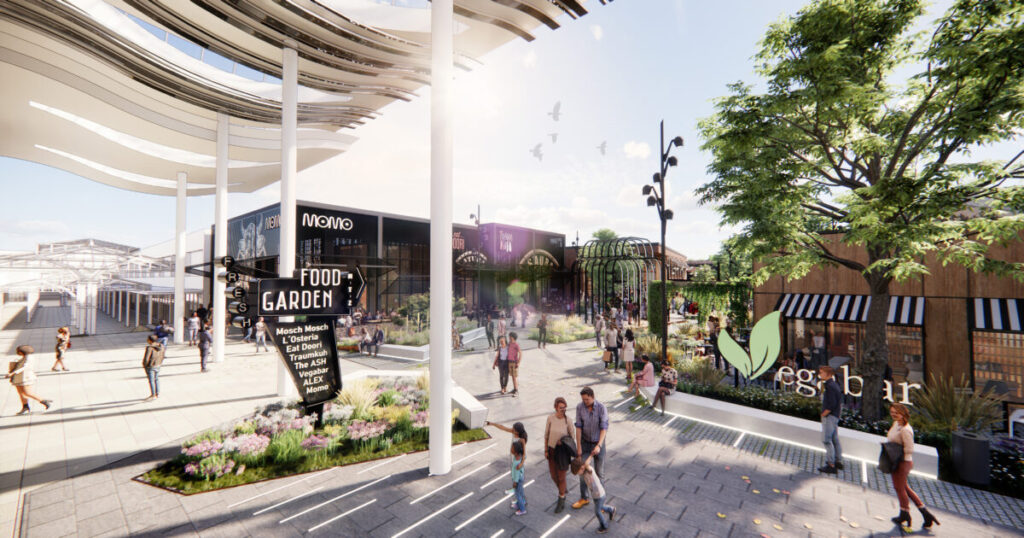
ACROSS: The Rhein-Neckar-Zentrum is another example of a location-specific realignment.
FRIEDLEIN: Absolutely. The conditions there are different to those of city center locations such as The Playce or Skyline Plaza Frankfurt. There are areas around the property that have been and are still being used in completely different ways. One such example is a former DIY store, complete with its own parking spaces. While a freestanding L’Osteria restaurant has been opened in the former DIY store parking lot, we were able to attract the JUMP House, among others, as a new tenant for the former DIY store building. They are perfect additions to the existing leisure facilities, which include an Indoor Skydiving wind tunnel, for example, as well as to the rest of the center’s tenant mix. And that’s what it’s all about: Creating worthwhile additional offers at the respective locations.
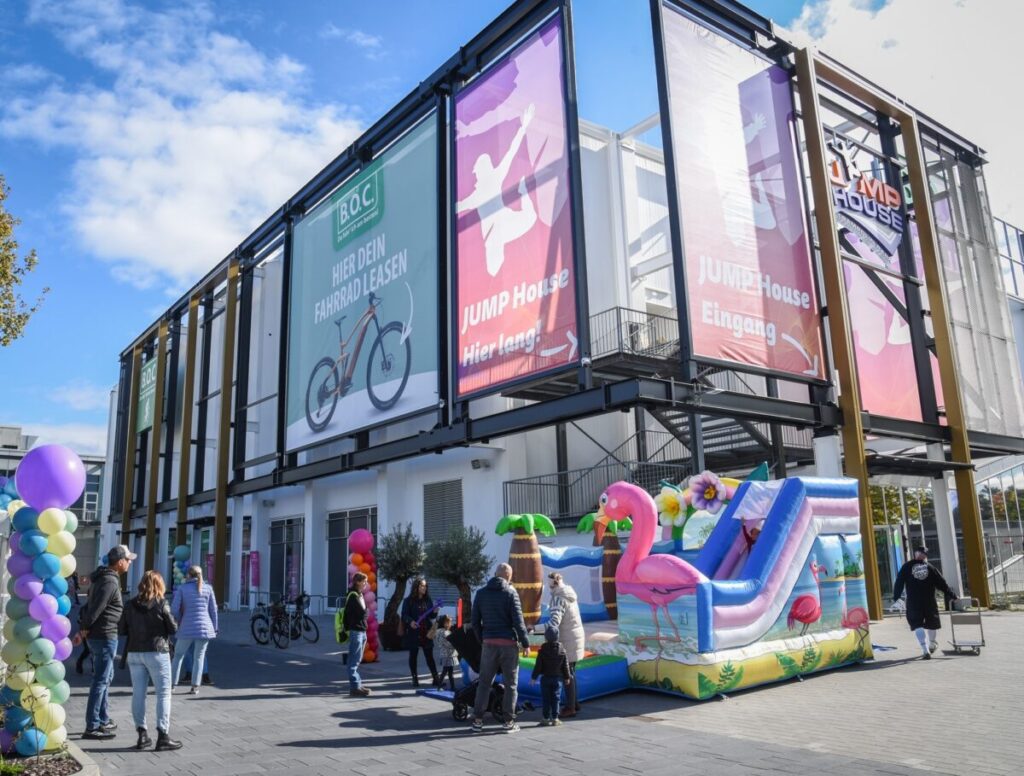
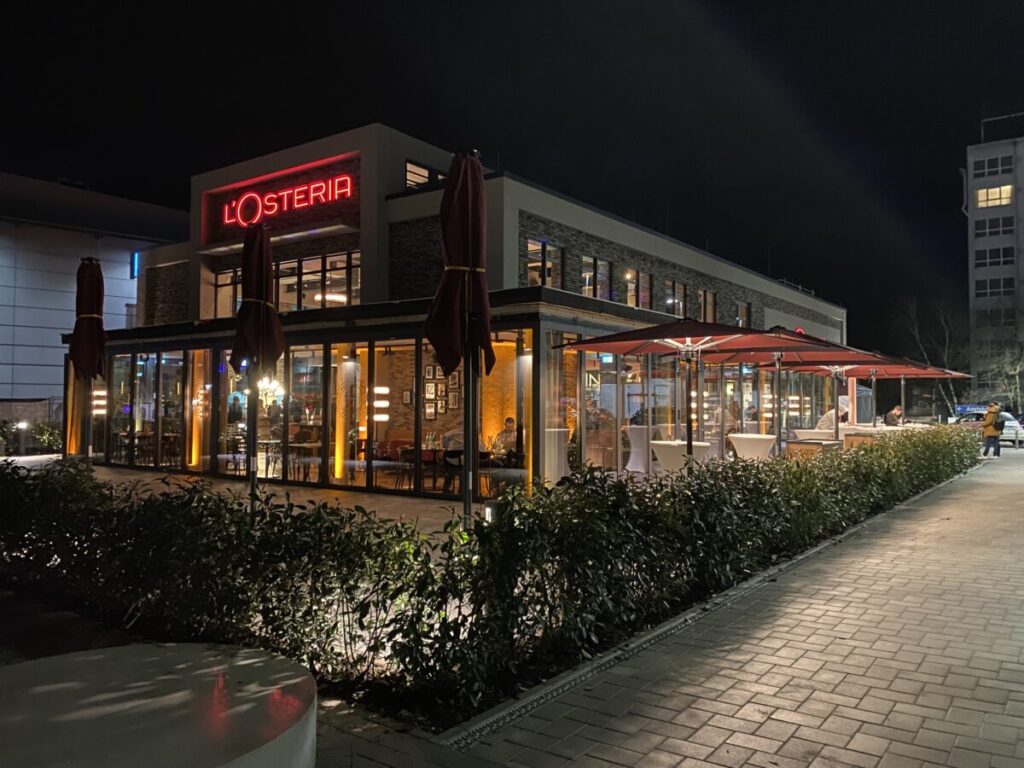
The refurbishment of parts of the Rhein Neckar Zentrum is complete and was officially opened (left). Among other things, a freestanding L’Osteria restaurant has been opened in the former DIY store parking lot (right).
ACROSS: Let’s take a more general look at the ECE portfolio. What special features do you have and what, in particular, are you currently excited about?
FRIEDLEIN: We spent a lot of time talking about trends, new sectors, and brands. All of those things are happening here. However, consistency and resilient partnerships are also very important. Our business is strongly characterized by the extensive and successful expansion efforts that we are engaged in with our long-term partners. Together, we have achieved significant sales growth – in some cases, even compared to the time preceding the coronavirus crisis. That’s precisely what ECE centers are all about: combining thriving businesses and long-term partnerships with new ideas in order to grow together.
ACROSS: Are you aware of any regional differences?
FRIEDLEIN: Generally speaking, the differences between the countries are not that significant. We have always operated different types of centers in different regions. In some countries, we have a head start when it comes to the combination of leisure, entertainment, and gastronomy. In Turkey, for example, where we manage a number of centers for different owners, it has always been a matter of course that people don’t just go to centers to shop. Shopping centers there have always been places at which people spend time with their families and friends and engage in leisure activities. The situation is quite similar at centers in Eastern Europe. In Germany, such a combination has only been of relevance for a few years.
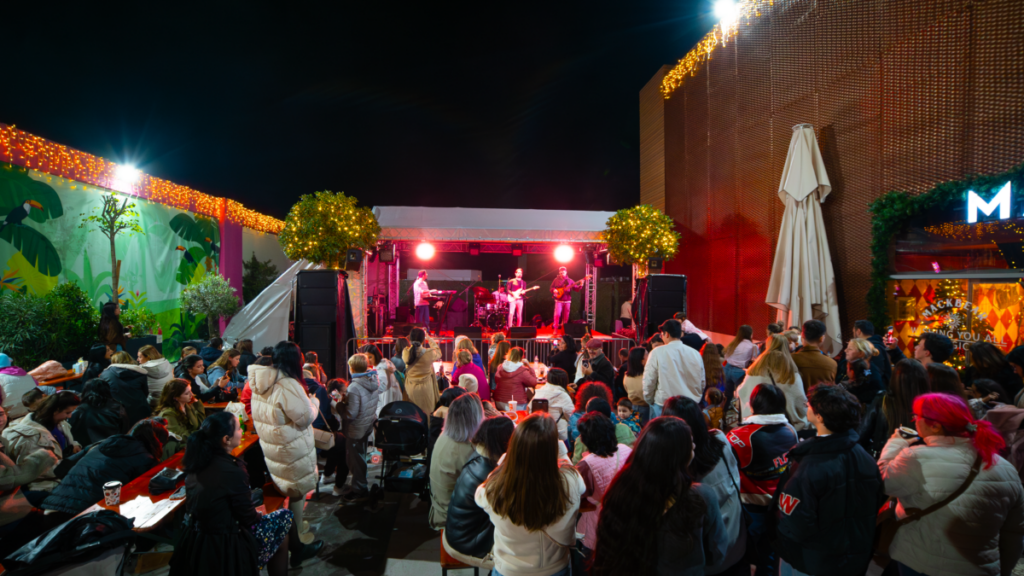
ACROSS: What specific brands or concepts are part of your expansion plan?
FRIEDLEIN: We are still very strongly represented in the fashion sector. Even though the overall proportion of fashion in the tenant mix has been reduced, it still accounts for the majority. Vertical concepts, such as the Inditex Group, which flexibly responds to market requirements through its various concepts, such as Zara, Bershka, and Stradivarius, are particularly innovative. The Spaniards are known for their ability to quickly implement trends in the production process. The system behind suppliers like Inditex is highly professional and is correspondingly appreciated by customers. This particular partner is, therefore, part of our expansion strategy, as is the Denmark based Bestseller Group, which is very successful globally and is a valued partner of ours thanks to its various concepts. Traditional, purely stationary retailers, such as New Yorker, are also very successful. The company has enjoyed impressive sales growth in recent years, is expanding, and is also looking for larger spaces.
ACROSS: Does the expansion signify that there will be larger areas or more areas?
FRIEDLEIN: Both. The examples mentioned earlier have one thing in common: More locations are being occupied, and the existing locations are generally growing in size. As such, it is our job to flexibly provide the respective space sizes at each center.
ACROSS: What role does the discount sector play?
FRIEDLEIN: Discount stores have gained significant importance. In that particular area, we find ourselves expanding with partners who were only interested in retail park locations a few years ago. Pepco, Action, and Woolworth are just a few examples. The latter, in particular, had fallen on hard times but have since firmly re-established themselves in the market. Opinions on discount stores are divided within the industry, but we simply have to acknowledge the fact that customer needs have changed. Consumers are multi-faceted and have no reservations when it comes to making contact with various concepts. So, if we want to remain relevant to customers, we have to offer them a full range of products and services.
ACROSS: Customer relevance is the overriding guiding principle of the shopping center industry. With that in mind: Which MAPIC Awards categories will become even more significant in the future?
FRIEDLEIN: The issue of sustainability is by no means a short lived trend. Given the high number of submissions in various categories, we can clearly see how strongly operators, developers, and property owners are engaged in the matter. Customers are also taking this issue very seriously. Furthermore, it is particularly important to constantly question yourself and to be aware of and meet the significantly increased requirements of the target groups you want to reach.
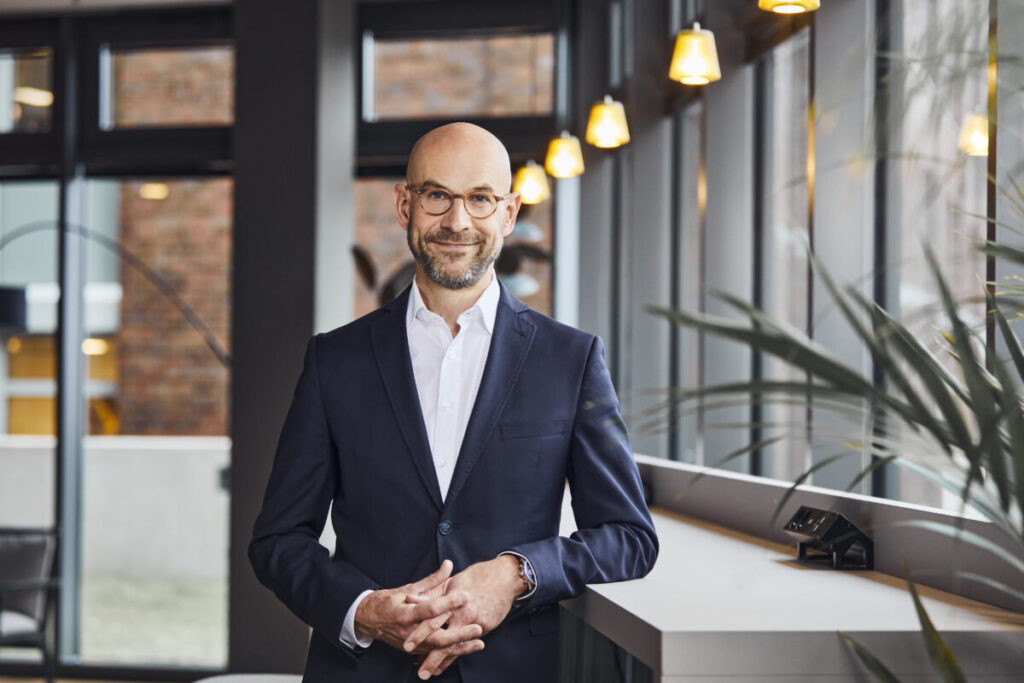
Steffen Eric Friedlein
Steffen Eric Friedlein is Managing Director Leasing at ECE Marketplaces

